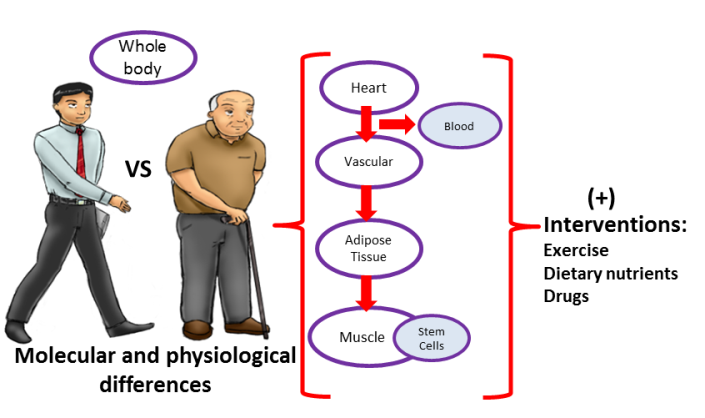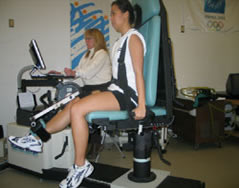Advancing muscle health research
Skeletal muscle, 40 percent of a human's body mass, is a unique and large tissue that significantly contributes to an individual's metabolism, locomotion, and overall quality of life. Skeletal muscle health is vital for powering the movements of daily activities so that we can enjoy life and be gainfully employed, Cardiac muscle (the heart) circulates blood and nutrients to supply all tissues in the body, while smooth muscle controls blood flow distribution to muscle and all other vital organ systems.
These physiological functions are well known to decline with age, and when combined with a predominantly inactive population, lead to a high susceptibility to age-related metabolic conditions such as obesity and type 2 diabetes, and even cancer.

These conditions have profound economic and quality of life implications that affect millions of Canadians, but the underlying molecular causes of this synergy between aging and inactivity leading to disease processes remain largely unknown.
Skeletal muscle has an important role to play in a variety of different conditions, including some of the most common diseases of our time:

- Metabolic diseases such as obesity and Type 2 Diabetes;
- Cancer and muscle wasting (cancer cachexia);
- Inactivity and muscle disuse conditions (eg. immobilization, nerve injury);
- Muscle degeneration diseases (eg. muscular dystrophy).
Compounding this is the fact that during the aging process, muscles become weaker and heart function declines. Thus, research in the area of muscle and heart health should be at the forefront of our understanding of how to improve the quality of life of individuals affected by these conditions.
Recent findings by York researchers
Recent findings have also indicated that exercise, or regular physical activity, can serve an important role in attenuating the loss of muscle and cardiac function with age and the progression of disease. Exercise is therefore a vital intervention which can be used to help improve the quality of life of millions of people.
At York University, there are currently 24 faculty members and greater than 120 trainees within both Kinesiology and Health Science and Biology that are studying and researching in the area of skeletal and cardiac muscle health and disease. Topics include the study of muscle metabolism, heart function, muscle development, blood flow regulation and muscle adaptations to exercise, metabolic disease and cancer. This represents the greatest focus of research on “muscle health” in Canada. Under the direction of Professor David A. Hood, York University’s NSERC Tier I Canada Research Chair in Cell Physiology, York has established a unique biomedical research centre focused on skeletal muscle, called the Muscle Health Research Center (MHRC). It is devoted to skeletal and cardiac muscle health and disease, metabolism, adaptation and the role of various forms of exercise in improving muscle function. The purpose of the MHRC is to facilitate the integrated study and understanding of muscle biology in the broadest terms, with implications for whole body health and the prevention of disease. A greater understanding of muscle function and heart health in aging and disease is one of the key components of maintaining a good quality of life with functional independence.
Investigating critical questions:
- What is the fundamental link between exercise, the creation of more cellular mitochondria, and corresponding increase in energy levels?
- How can muscle tissue be healed much more quickly after damage, at the cellular level?
- What is the relationship between muscle carbohydrate and fat metabolism, and how can we prevent Type 2 Diabetes and obesity using exercise interventions?
- What is the link between our genetic make-up and the adaptation and evolution of our differing muscle fiber types (i.e. fast-twitch and slow-twitch muscles)?
- What is the cellular basis for muscle protein breakdown in disease states, and with advancing age? Can exercise prevent this?
- How does oxidative stress (i.e. free radicals) damage muscle? Is exercise helpful or harmful?
- How does exercise promote better blood flow and nutrient supply to muscles?
- What makes blood vessels grow?
- How does the heart adapt to exercise, especially with age?
Specialized laboratory equipment available within the MHRC helps us answer these questions.
The MHRC Core Facility is a space that houses shared critical equipment to facilitate our collaborative research potential. It includes a Clinical Evaluation Unit, which allows for an increasing number of studies to be conducted in human subjects, in addition to our current research using animal models and muscle cells in culture.
The Muscle Health Research Center at York University is unique in North America. The work of this Centre will continue to provide new and unique knowledge which should have a dramatic impact on the health of Canadians.
For further information on the MHRC and Muscle Health, see these short videos made by MHRC.
